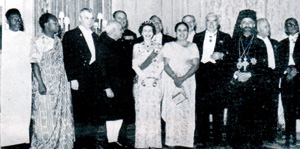Sunday Times 2
Her strength was her ability to overcome challenges
Sirimavo Bandaranaike, the world’s first woman Prime Minister, was the wife of the late Prime Minister S.W.R.D. Bandaranaike, founder of the Sri Lanka Freedom Party and chief architect of the 1956 peaceful revolution, popularly called the ‘Era of the Common Man”.

Ms. Bandaranaike attending a Commonwealth summit
Ms. Bandaranaike saw the light of this world on April 17, 1916, exactly 100 years ago.After her schooling at St. Bridget’s Convent in Colombo, she married S.W.R.D. Bandaranaike on October 3, 1940. Mr. Bandaranaike was then Local Government Minister in the State Council set up under the Donoughmore Constitution. In the early years of her married life, she participated in many social service activities and served in several social service institutions. She became an active member of the Lanka Mahila Samithiya and was a member of its main committee. She became the treasurer of this organisation in 1945.
Well acquainted with village life, she visited villages to serve the people. Though her political baptism was mainly through her husband, she was no stranger to politic s. Her father Barnes Ratwatte was a candidate for the Balangoda by-election for a State Council seat against the late A.F. Mollawure in 1943. She had an insight into money power, thuggery, and the power of officials in this by-election in which her father was defeated.
Though she maintained a low political profile when her husband was alive, during the period he was Minister in the UNP government and the years in the wilderness during the early period of the SLFP, she had a close view of political events and personalities of the time. Then came the 1956 victory, which was a watershed in the country’s history.
The assassination of her husband in 1959 was a turning point in her life. She had the burden of looking after a young family and also an obligation to her husband’s political life and his supporters who were without his able leadership. The knowledge she had gathered by silently watching his political career now was of singular assistance in her future life.
One of her great qualities was her ability to take decisions. A leader must be a good decision maker. She took the plunge into active politics, especially after the defeat of her party at the election in March 1960. She had common sense and knowledge about the country’s affairs. She became the leader of her husband’s party and Prime Minister in July 1960. She was a great believer in her party and was loyal to its members and helped them in many ways. She did not tolerate those who betrayed the party as she realised that her power base was within the party.
She was exposed to intra-party crises when a group led by Mapitigama Buddharakitha Thera assassinated her husband. The same thing had happened to “Julius Caesar” centuries ago when the last person to stab him was Brutus. In July 1960, she headed the government. Though she had the knowledge of handling the machinery of power, she always took advice on technical matters. During this period, she faced the biggest challenge to the state in the attempted coup d’etat by a group of police and army officers. When this was brought to her notice, she acted fast to bring the situation under control and ordered the arrest of those involved. By this action she saved Sri Lanka from a military government that would have endangered its democratic values.
She presided over the takeover of assisted schools that had existed from colonial times. Her party was defeated at the election of 1965 — again as a result of an inner party revolt, this time when a group led by C.P. de Silva left the party. She strongly condemned those who left the party and betrayed it.
It was when she was in opposition from 1965 to 1970 that she exhibited her real leadership qualities. Her party members had to face election petitions and harassment at the hands of the UNP government. Some of her family members were also harassed. She faced all this harassment with great courage and determination. The year 1967 saw the birth of the SLFP Lawyers Association in which she had much confidence. This organisation helped her and her party cadres who had to face election petitions, police harassment and thuggery during elections.
During her second term as Prime Minister, she faced the JVP insurrection –another challenge to the state — and with limited resources she was able to bring the situation under control. Her Land Reform policy, though it had many good features, was not successful in its implementation. The People’s Bank opened the door of the banking to the rural poor.
Following her defeat at the 1977 elections, the introduction of the Presidential and proportional representation systems were seen as attempts to prevent the SLFP from winning elections and bring about a repetition of 1956. During this period she lost her civic rights, but her political life continued and it culminated in her becoming the Prime Minister under her daughter’s presidency later.
In foreign relations, she continued the policy of non-alignment, which was in vogue at the time. Her good relations with India and China benefitted the country. She became the head of the Non-Alignment Movement at the Colombo Conference in 1976. She settled the vexed question of Kachchativu with India.
She was a devout Buddhist and was responsible for helping in many ways the ‘Bhawana Centre’ in Colombo, Bauddhaloka Mawatha. She was assisted in her efforts to perpetuate meditation by Mrs. Sri Nissanka and Mrs. T.U. de Silva.
She had firm principles in her politics and personal lives. I would end this tribute with words of Professor E.F.C. Ludowyke: “Her deficiencies were offset by the spirit in which she faced difficulties such as no party leader in Ceylon had to encounter”.

